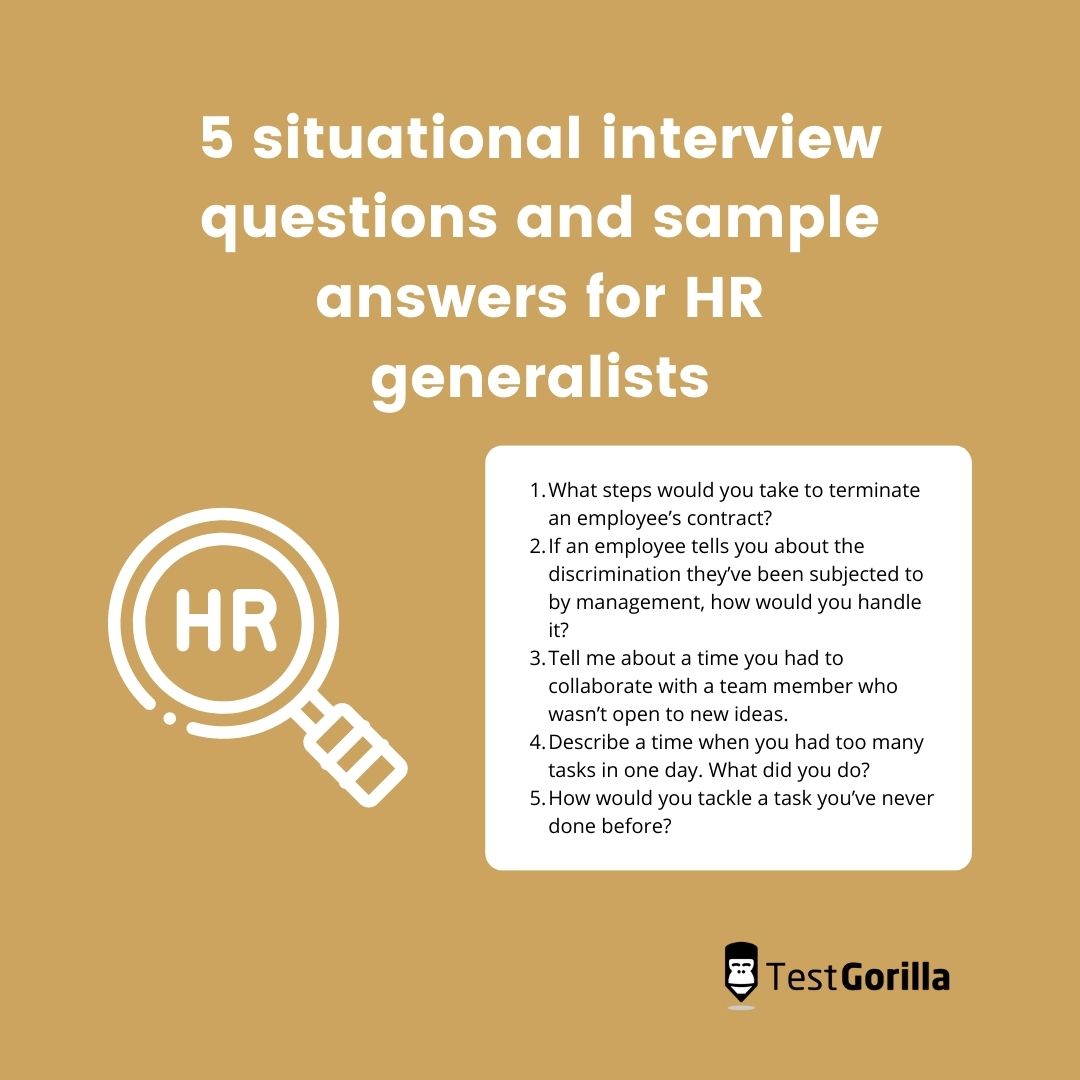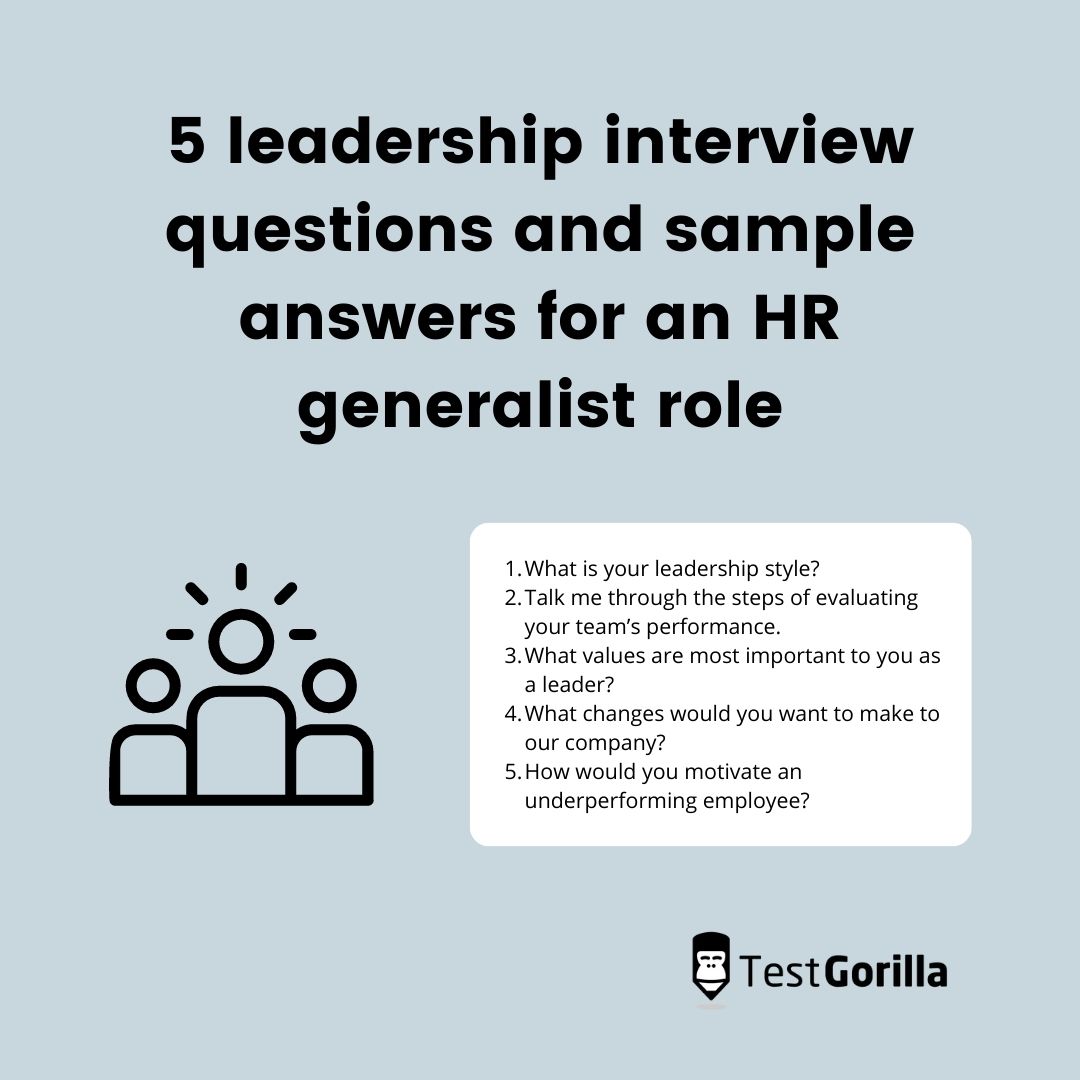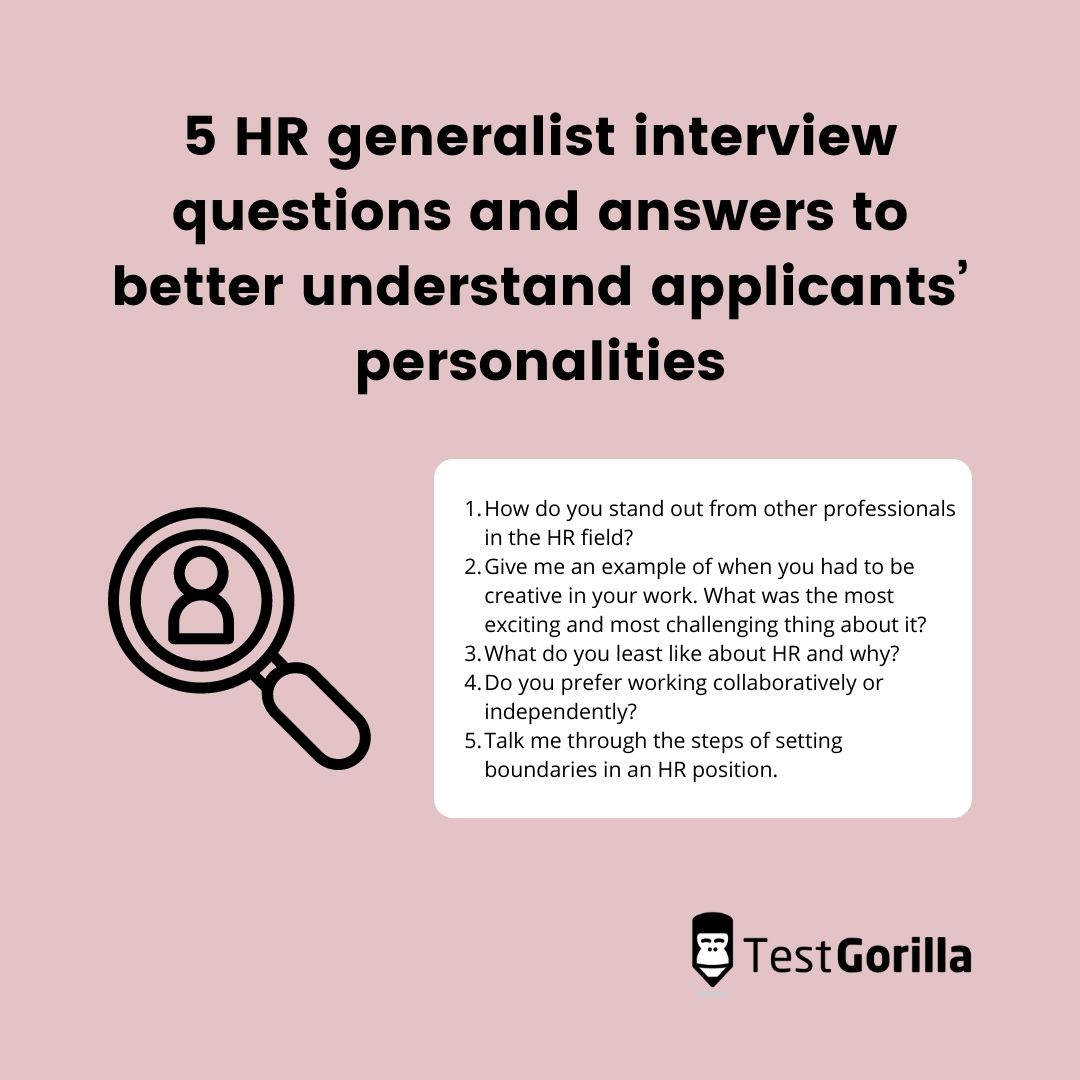45+ HR generalist interview questions to ask job applicants
If you’re hiring an HR generalist, you need to find someone who can add to your company culture and facilitate the work of your HR team. Do they have consistent motivation and strong professional skills? Are they good communicators? Are they able to come up with innovative solutions to common HR problems?
In short, you need employees who have relevant work experience and the right skills to contribute to your HR department. One of the best ways to identify skilled HR professionals is to use an HR Fundamentals test to evaluate their core competencies and then interview the best applicants.
HR generalists need to manage the daily needs of the human resources department. For this, they should know how to:
Assist in talent acquisition and recruitment
Assist with payroll management
Enforce company policies
Plan training programs
Conduct employee onboarding
Provide support to the HR department and other employees
But how can you assess these abilities?
With our 45+ HR generalist interview questions, you can easily identify the best talent for your company. Find these questions in our comprehensive guide below, with examples of top answers. And, if you’d like to assess payroll skills in particular, check out our selection of payroll interview questions to ask applicants.
Table of contents
- 15 situational HR generalist interview questions
- 5 situational interview questions and sample answers for HR generalists
- 10 interview questions related to leadership skills to ask HR generalists
- 5 leadership interview questions and sample answers for an HR generalist role
- 16 personality interview questions for HR generalists
- 5 HR generalist interview questions and answers to better understand applicants’ personalities
- At which stage of the hiring process should you use these HR generalist interview questions?
- Hire the right candidate using skill assessments and our HR generalist interview questions
15 situational HR generalist interview questions
Check out these 15 situational interview questions to ask HR generalists and better understand their experience and behavior.
1. How has your work experience prepared you for this position?
2. Describe a time your company used a new recruitment method. How did you adapt to it?
3. How do you stay compliant with national regulatory laws?
4. What steps would you take to terminate an employee’s contract?
5. How would you improve our employer branding?
6. What’s your approach to building employee-benefit packages?
7. Tell me how you would implement new HR policies.
8. What would you do if an employee requests confidential or sensitive information?
9. If an employee tells you about the discrimination they’ve been subjected to by management, how would you handle it?
10. Tell me about a time you had to collaborate with a team member who wasn’t open to new ideas.
11. Describe a time when you had too many tasks in one day. What did you do?
12. How do you adapt to significant changes in a company?
13. Have you ever disagreed with your manager about the best way to handle a situation?
14. How do you ensure you and your team members communicate effectively at all times?
15. How would you tackle a task you’ve never done before?
5 situational interview questions and sample answers for HR generalists
Below, you’ll find sample answers to five of the most important situational interview questions. Use them to assess candidates’ responses and find the best match for the HR generalist position.
1. What steps would you take to terminate an employee’s contract?
Candidates should be able to explain clearly how they would terminate an employee in your jurisdiction. Detailed answers usually mean they have more experience with this task. They may discuss a real example of how they navigated this process in previous jobs and how it improved their skills.
The steps of employee termination include:
Document the reason for termination
Hold training or coaching sessions if necessary
Create a performance improvement plan
Arrange a meeting to terminate the employee
Conduct an exit interview
Give a bonus point to candidates who explain the benefits of exit interviewsand how they would conduct one.
2. If an employee tells you about the discrimination they’ve been subjected to by management, how would you handle it?
New research suggests that over 35% of employees deal with conflict frequently. These disagreements may relate to missed deadlines, poor communication, or even discrimination.
Employees shouldn’t have to experience discrimination, so it’s essential to hire an HR professional who can settle conflicts.
Candidates may explain their thought process behind conflict resolution. A few steps could include to:
Document the complaint
Review relevant company policies
Conduct an investigation
Interview all parties
Take appropriate action
Log a report of the resolution
Follow up if necessary
You can use our Problem-Solving test to better understand the candidate’s ability to respond to complex situations.
3. Tell me about a time you had to collaborate with a team member who wasn’t open to new ideas.
Disagreement can occur frequently in many jobs, especially if employees fail to acknowledge their coworkers’ ideas. Therefore, it’s essential that team members actively listen to suggestions and make an effort to discuss or even test them.
The ideal candidate should mention their preferred communication typeand how they would propose new ideas to team members who aren’t as open to receiving them. Pay special attention to their body language to determine whether they can remain neutral and polite.
You can also send candidates a Communication test to learn about their active-listening skills and ability to use professional communication etiquette.
4. Describe a time when you had too many tasks in one day. What did you do?
Candidates with excellent time-management skills are more likely to succeed in an HR position. They understand how to manage their tasks without becoming overwhelmed.
For this question, the candidate should give an example of a time when they were particularly busy but managed to organize their day successfully and prevent unnecessary stress. A couple of common examples are to:
Plan the day in advance
Make a to-do list
Prioritize the most important tasks for the day
Use time blocks
You can evaluate how candidates manage their workload and meet deadlines using a Time Management test. This assessment offers insight into how they avoid procrastination and stress.
5. How would you tackle a task you’ve never done before?
The ability to step outside of your comfort zone is essential in many jobs. Candidates should feel prepared to try new tasks and take on various responsibilities when working in HR. Therefore, you need to hire a candidate who is motivated to improve continuously.
To complete a task they’ve never done before, some applicants may explain that they’d ask team members for advice on how to complete the task. Others might prefer to rely on personal research and use the company’s resources to learn about the task requirements.
The best insights on HR and recruitment, delivered to your inbox.
Biweekly updates. No spam. Unsubscribe any time.
10 interview questions related to leadership skills to ask HR generalists
Ask candidates some of the interview questions in this section to evaluate their mentoring and leadership skills and evaluate their growth potential in a collaborative environment.
1. What is your leadership style?
2. What has been your hardest decision as a leader?
3. How would you motivate an underperforming employee?
4. Talk me through the steps of evaluating your team’s performance.
5. How do you respond to constructive feedback in the workplace?
6. What values are most important to you as a leader?
7. Do you prefer verbal or written communication? Why?
8. What changes would you want to make to our company?
9. How do you build support for ideas and goals with your team members?
10. How do you delegate responsibilities to your team?
5 leadership interview questions and sample answers for an HR generalist role
Refer to these sample answers to identify potential leaders who can thrive in the role of an HR generalist but who also have the potential to grow.
1. What is your leadership style?
Everyone has their own leadership style when it comes to collaboration, although some may use a combination of different styles. Understanding how the candidates would lead others is essential for identifying potential mentors.
The ideal candidate will provide real examples of how they’ve helped others in a previous role. For instance, they might use the coaching style to nurture the team’s skills while offering advice on professional development.
To hire a skilled HR leader, consider using a Leadership and People Management test.
2. Talk me through the steps of evaluating your team’s performance.
Candidates who have experience with HR should know how to assess team performance. They may discuss different methods of evaluating the team and identifying potential areas of improvement.
HR generalists need to be able to monitor others’ performance without micromanaging or overwhelming them with feedback.
Here are some of the elements of successful performance evaluation they may mention:
Feedback from team members
Project-delivery success rate
Team development over time
Conflict resolution
Team turnover rate
Research by Gallup shows that offering frequent, focused, and future-oriented feedback boosts team performance, so it’s worth asking follow-up questions to determine if their feedback methods are efficient.
3. What values are most important to you as a leader?
This question is more personal because it focuses on the candidate’s own values.
They should provide an honest answer and explain what they would do to reinforce positive behaviors in the workplace. For example, the candidate may focus on the value of respect and explain that it enables them to treat all employees fairly and appreciate their efforts.
Use our Culture Add test to determine whether the candidate’s beliefs align with your company’s expectations.
4. What changes would you want to make to our company?
Candidates may already have an idea of some of the changes they would make if you hire them. They could have a passion for improving the employee experience or creating a new training system for those with anxiety problems.
Committed candidates usually research the company and how they can contribute to it in the long term, so expect applicants to provide answers that match your company’s values.
5. How would you motivate an underperforming employee?
Employees may not always feel motivated, which can hinder productivity and stop them from achieving goals. The lack of energy could be attributed to demanding deadlines, unhappy clients, or a poor work-life balance.
An HR generalist should have the skills to address such issues, support employees, and boost team morale. For example, they may arrange a social event to help team members overcome stress or organize training sessions to give the team more confidence in their abilities.
Send candidates a Motivation test to understand what drives them. With this test, you can also determine whether they have the characteristics and mindset to succeed in HR.
16 personality interview questions for HR generalists
Use these 16 personality interview questions to become more acquainted with the candidates you’re interviewing.
1. How do you stand out from other professionals in the HR field?
2. Do you prefer working collaboratively or independently?
3. Tell me what you are passionate about.
4. What has been the greatest achievement in your life?
5. What do you least like about HR and why?
6. Give me an example of a time when you had to be creative in your work. What was the most exciting and most challenging thing about it?
7. How do you show team members appreciation?
8. If you had to describe yourself in five words, what would they be?
9. How do you react to positive feedback?
10. Talk me through the steps of setting boundaries in an HR position.
11. What role do you assume when you work within a team?
12. How do you react when someone interrupts you while you are busy?
13. What one personality trait would you like to improve?
14. Explain how you would maintain professional relationships in HR.
15. Share some of your short- and long-term career goals.
16. What do most people get wrong about working in HR?
5 HR generalist interview questions and answers to better understand applicants’ personalities
Review these sample answers to determine who are the candidates who best suit your company’s expectations and workplace culture.
1. How do you stand out from other professionals in the HR field?
You may receive a large handful of job applicants, but it only takes one really good answer for somebody to stand out. The ideal candidate will know how to make a solid impression.
For example, they might talk about long-term goals for improving the employee experience and leading the entire HR department. Candidates with confidence and determination are the ones to look out for.
2. Give me an example of when you had to be creative in your work. What was the most exciting and most challenging thing about it?
Many recruiters look for creative candidates who are able to constantly come up with unique ideas and strategies for self-improvement.
Each candidate should give an example of how they use their creative skills in the workplace, whether that’s by finding innovative solutions to problems, brainstorming creative marketing campaigns, or using mindfulness and meditation to give their imagination a boost.
You can also use a Big 5 (OCEAN) personality test to better understand candidates’ levels of openness, conscientiousness, extroversion, agreeableness, and emotional stability.
3. What do you least like about HR and why?
Everyone is allowed to have personal dislikes but they should also be open to seizing up the chance to step outside of their comfort zone and try new things.
With this question, you can learn more about the candidate’s personality and what they expect from the HR generalist position.
4. Do you prefer working collaboratively or independently?
Candidates usually either love to work on their own or in a team. Their answers may offer insight into their working habits and ability to collaborate with others. Independence is key, but all candidates should be motivated and confident to participate in teamwork-related projects.
Use a 16 Types personality test to better understand candidates’ working style, decision-making process, and the ways in which they handle new and challenging situations.
5. Talk me through the steps of setting boundaries in an HR position.
An HR generalist role can be demanding for many people. Therefore, it’s essential to set boundaries to avoid burnout and procrastination.
Candidates should give examples of how they enforce rules in the workplace. For instance, they might set expectations with team members and look for ways to improve their time-management skills.
At which stage of the hiring process should you use these HR generalist interview questions?
We recommend you use interview questions after sending candidates a skills assessment with a selection of up to five skill tests. This process can help you identify top job applicants with the skills and experience to work in HR and invite the best ones to an interview.
You can also use tests to learn more about candidates’ personalities. For example, you might send them a 16 Types personality test, which offers insight into their personal aspirations and motivations. Or, you might use the Enneagram test in your HR assessment, because it focuses on the candidate’s response to stress and new opportunities.
Once candidates have completed the tests, you can compare their results. With this data-driven information, it should be easier to narrow down your list of candidates. That way, you’re only interviewing applicants with suitable skills and experience.
Hire the right candidate using skill assessments and our HR generalist interview questions
Are you looking to hire the right candidate for an HR generalist role but don’t know where to begin?
To get started, simply head on to TestGorilla’s test library to build relevant assessments for your hiring process. You can combine up to five tests in a single assessment, which you can then send to all candidates who apply to your open HR role.
Our 300+ tests help you evaluate anything from personality traits to role-specific skills to situational judgment. Pick the tests that best match your requirements for your open HR position and sift through applications quickly and with ease.
Then, you simply need to invite the best candidates to an interview and use our HR generalist interview questions to make your interviews more engaging, collect plenty of information, and make the right hiring decision.
Try a free demo with us to better understand how skills tests can enhance your recruitment strategies in the long term and see for yourself why 9000+ companies are already using them to make better hires.
You've scrolled this far
Why not try TestGorilla for free, and see what happens when you put skills first.

















